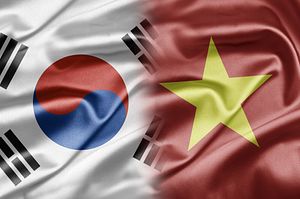On May 5, South Korea and Vietnam signed a bilateral free trade agreement. The FTA, which was officially inked by the country’s trade ministers in a ceremony held in Hanoi, puts the finishing touches on a pact which the two sides have been negotiating for years and is a further boost to their strategic partnership.
According to reported figures from South Korea’s Ministry of Trade, Industry and Energy, under the FTA, Vietnam will completely remove its import duties on 89.9 percent of all products from South Korea over a 15-year period following its implementation, while South Korea will do the same on 95.4 percent of all products imported from Vietnam.
The agreement is expected to significantly strengthen trade and investment ties between the two countries. South Korea is already Vietnam’s biggest investor, second official development assistance and tourism contributor, and third-largest trading partner after China and the United States. But in a statement, Vietnam’s trade minister Vu Huy Hoang said that the agreement could see Vietnam and South Korea’s annual trade more than double over the next five years from around $30 billion last year – the largest amount ever since the countries established diplomatic ties in 1992 – to $70 billion in 2020. Vietnam in particular has been looking to FTAs – including ones with the European Union, the Russia-led Customs Union, and of course the Trans-Pacific Partnership – as a way to boost its economic development. South Korea already has eight FTAs in effect according to its Ministry of Foreign Affairs.
The FTA will also be a boost to the strategic partnership inked between Vietnam and South Korea back in 2009. That partnership is based not only on an important economic component, but also other aspects as well including strong people-to-people ties as well as their roles as influential powers in the broader East Asian region. Both sides also share common concerns, including a rising China in their neighborhood.
The two countries have agreed to implement the deal before the end of 2015. The pact will need to be ratified by both countries’ legislatures before this happens. As Vietnamese prime minister Nguyen Tan Dung told South Korea’s trade, industry and energy minister Yoon Sang-jick, signing the FTA is an “initial step,” and “it is more important for the two countries to have sincere cooperation so that the pact’s implementation will be smooth.”
































